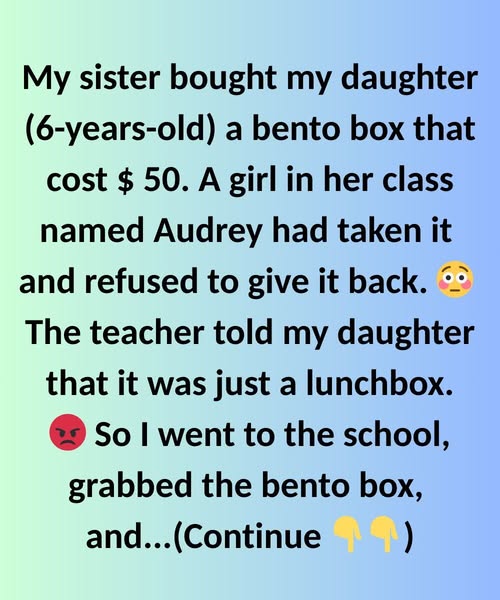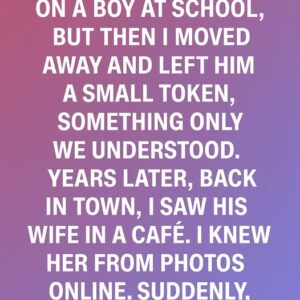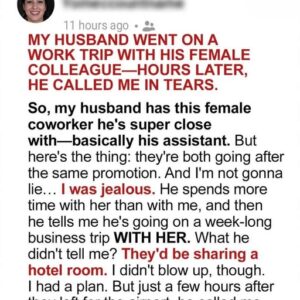
My sister bought my daughter (6-years-old) a bento box that cost $50.
A girl in her class named Audrey had taken it and refused to give it back.
The teacher told my daughter that it was just a lunchbox.
So I went to the school, grabbed the bento box, and handed it straight to my daughter.
I didn’t yell. I didn’t make a scene. I just said, loud enough for the teacher to hear, “This belongs to my daughter. It was a gift. It’s not ‘just a lunchbox’ to her, and that matters.”
That should’ve been the end of it.
But that was Tuesday.
By Thursday, I got a call from the principal asking me to come in “for a conversation.” I asked if something happened. She said, “Nothing serious, we just want to discuss boundaries and respect.”
When I got there, I was shocked to see Audrey’s mom sitting in the office, arms crossed and glaring like I’d stolen her mortgage papers.
Before I could sit down, she launched into me. “You had no right to take something out of my daughter’s hands like that. She said you embarrassed her. She cried after school!”
I was stunned. “Your daughter took my kid’s lunchbox. For two days. And refused to give it back.”
“She didn’t know it wasn’t hers!” the mom snapped.
“It has my daughter’s name etched into the side,” I said, pointing out the obvious. “In permanent gold letters.”
The principal tried to mediate, but the tension was thick. Eventually, she said maybe the best course of action was for the girls to share the lunchbox until this all blew over.
I actually laughed. “So, let me get this straight. My daughter gets a gift, someone else takes it, and the solution is…sharing?”
That’s when I realized something wasn’t right here. This wasn’t just about a bento box. This was about how people treat kids who don’t make noise. My daughter, Nari, is shy. She won’t cause a scene. Audrey? She’s loud, confident, the kind of kid teachers praise for “leadership.”
But confidence without kindness? That’s not leadership.
I asked to speak with Nari’s teacher privately. I needed to understand why, when a six-year-old said her lunchbox was taken, she was brushed off.
The teacher looked tired, maybe overworked. She said, “Honestly, I thought it would just sort itself out. It’s not always clear who brings what…”
I opened my phone and showed her the photo from the day Nari opened the bento box at home—her eyes glowing, holding it like treasure. “It’s clear to me,” I said. “And it should’ve been clear to you when a kid told you something was taken.”
To her credit, the teacher apologized. She admitted she didn’t handle it right. “I’ll talk to Audrey,” she said, “and I’ll talk to the class. About boundaries, and respect.”
The next day, Nari came home grinning. “Audrey said sorry. She didn’t sound like she meant it…but she said it.”
Progress.
But here’s the twist: two weeks later, Nari came home without the bento box again.
I panicked. “Did someone take it again?”
She shook her head. “I gave it to Audrey.”
“What?” I asked, confused. “Why?”
Nari fiddled with the edge of her sleeve. “Audrey said she doesn’t have nice stuff. She only gets plastic ones from the dollar store. She said she just wanted to feel special. Even for one lunch.”
I sat down.
Because suddenly I saw it all differently.
I wasn’t wrong to stand up for Nari. She needed that. But maybe Audrey wasn’t just a brat. Maybe she was a kid acting out from want, not malice. Maybe she wasn’t used to getting nice things—or being told she deserved them.
So I talked to my sister and we ended up doing something small but meaningful.
We found an affordable version of the same bento box online—less fancy, but still colorful and pretty. We wrapped it with a note that said: “Everyone deserves to feel special sometimes. Enjoy!”
We asked the school to give it to Audrey privately, no names attached.
Two days later, Nari came home and said, “Audrey was different today. She let me borrow her crayons. She even gave me half her cookie.”
Maybe it was the bento box. Or maybe it was just someone finally being kind to her without expecting something in return.
Either way, everything changed.
Here’s what I learned: Standing up for your kid is essential. But sometimes, when you look deeper, the “mean kid” is just a child trying to feel seen. Boundaries matter, yes—but so does compassion. We can teach both.
If this story made you think, smile, or even cry a little—hit that and share it. You never know who might need this reminder today.





